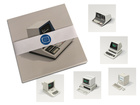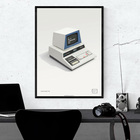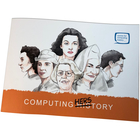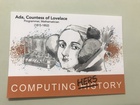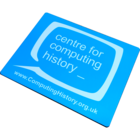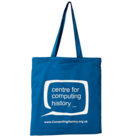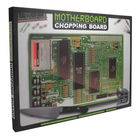
| Home > LEO Computers > LEOPEDIA > Oral & Narrative Histories > Alan Hooker: Intervie ... November 2018, 68654 |
Alan Hooker: Interview, 21st November 2018, 68654
| Home > LEO Computers > LEOPEDIA > Oral & Narrative Histories > Alan Hooker: Intervie ... November 2018, 68654 |
Copyright
Alan Hooker and LEO Computers Society
Digital audio of a recorded interview with Alan Hooker, who worked as a Programmer on LEO I, LEO II and LEO III rising to Programming Manager. He joined LEO in 1958 and left in 1965.
Interviewer: Paul Bygrave
Date of interview: 21 Nov 2018
Length of recording: 6m46s
Copyright in recording content: Alan Hooker and the LEO Computers Society
Abstract: After failing to take a Physics degree at Bristol University followed by National Service in Royal Engineers as commissioned officer, a chance meeting with a fellow Bristol student Brian Mills who had been recruited by Lyons for LEO, Alan took the LEO aptitude test and after interview by David Caminer joined LEO as a maintenance programmer on LEO I. Worked in Betty Cooper’s team whom he describes as one of the best managers he ever worked for. Converted LEO I programs to run on LEO II, then involved in programming a number of service bureau applications and the Standard Motor LEO II/8. Involved at a more senior level with the LEO III to demonstration to prove to the Post Office LEO IIIs multiprogramming capability. Became Programming Manager leading team of 25 charged with producing standard business routines. Left LEO after merger with English Electric, moved to DataSolve as Technical Director. Returned to ICL after grand merger as Project Manager at Dataskill.
Date : 21st November 2018Physical Description : 1 digital file, audio Transcript : Interviewee: Alan Hooker Interviewer: Paul Bygrave Date of Interview: 21.11.2018 Transcript Editors: David Phillips, Michael and Helen Jackson PB: It's Wednesday 21st of November 2018 and I am Paul Bygrave. I am interviewing Alan Hooker to give us the story of his involvement with LEO Computers from the earliest days. Good morning Alan Hooker. AH: Morning. PB: We are recording this interview as part of the LEO Computer Society Oral History Project. The audio version and the transcript will be lodged at a central archive and made available for researchers and members of the public. The transcript of this voice recording may/can be the subject of subsequent editing with the agreement of the respondent - Alan Hooker. Mistakes may be corrected and some clarification may be added within the text in italics and terms which may not be familiar to readers are explained in end notes. Alan, perhaps you'd like to start and introduce yourself? Family, let me start asking you about where, where you were born and when? AH: Well I was born on May the 23rd, 1934 in a town called Failsworth which is on the road between Manchester and Oldham. The postal address was Manchester but it was slightly nearer to the middle of Oldham. I went to school locally, the local church primary school, and then, from there went on to the grammar school. And then we moved house, but only two or three miles, to go and live in New Moston which is actually in Manchester, which is where I stayed till I left school at, in the local grammar school, so that was that. PB: Going back a little, what were your, what were the occupations of your mother and father? And do you have any early memories that you are able to talk about? AH: Well my father was a cabinet maker and did an apprenticeship with a company in Manchester. But when he, when we reached the 1930’s, when the bitter depression and quality furniture, the bottom dropped out of the market; he then really changed to, from cabinet making to general woodwork, carpentry and so on. And he worked, during the war he was directed labour, after the war he worked on houses and various things and until, he died fairly young, he was only just over fifty when he died. And my mother did as and when jobs, she worked in a shop, she too was directed labour during the war or she worked on repairing aeroplanes that had been shot down. And afterwards she took a lodger, students initially, and that sort of topped up her pension and kept her going, so, so that was my mother and father. And, I have flashbacks of the childhood of, I mean I remember the day war broke out, for example, where someone came out and said ‘war’s been declared’, I didn't know what either of those words meant, ‘war’ or ‘declared’, but I remember this little girl telling me very solemnly. I can remember shopping during the war, I can remember queuing, I can remember ration books. But to a child that was life it wasn't hardship, it was what we did. And life only became easier, in terms of food and so on, in the, I think the early ‘50s. I think it, I think rationing stopped then when I was in university. It wasn't a bad life, we played in the backs with all the kids and we kept rabbits and so on. No, it wasn't a bad life. PB: Okay. Talking about your education, what was your education background, early schooling, further education, university? AH: I, my first school was St. John’s Primary School where I could actually cross the road, squeeze through the railings and be in school, so that was easy. From there I got a scholarship, it was classed, I think in those days it was called a ‘Lancashire County Scholarship’, which takes me to Chadderton Grammar School, that was a, I think about four or five miles away, and so I went there by school bus and when I got older I would cycle to school. I had a really good time at school. I wasn't particularly outstanding as an athlete but I played most games in the second eleven. But the big thing at school was the school operatic society so I sang in that for four years, doing Gilbert and Sullivan and so on. And I left school in 1952 to go to Bristol University and to read physics. I had no idea what reading physics was about, I'd, it was just part of the progression, you went as far as you could. And after a year in, reading physics, I realised that I was actually doing the wrong thing but in those days it was difficult to change so I sweated it out. I left without a degree but I have been Chairman of the Union Club, I have been Stroke of the First Aid, I had a university education you might say. From there I went into the army, oh, do you want more on education? PB: Well, in terms of, just to round off on education, were there any special events and/or incidents that had a bearing on the subjects you chose to study, in those days? AH: My handwriting was bloody awful, and it still is, in fact it's worse now. So I found that I was being punished more for the presentation in my work than for the content. And I dropped anything that, as you get choices, and the easiest thing to stick with was maths. So I, I could do maths, fortunately, it's still, I can still do maths, and physics was the obvious choice. So that's, that's what I did, I went up to university with a grant to do maths and physics. (Phone rings [00:06:52]) PB: Yes. AH: Excuse me. AH: Well I realised I wasn't a physicist. So I had a vague idea that I'd somehow want to go into management, whatever that was, but first I had to get my National Service done. And when I finished National Service I ... PB:What area of National Service were you in? AH: I was in the Royal Engineers. PB: Okay. AH: And I, I had a good time there, it certainly wasn't wasted. I had eighteen months continuous training. I trained to be a surveyor, I trained to be an officer after I was, I mean obviously I was training to be a weapons instructor and so on. And I finished as an [inaud] [00:00:51] of the headquarters regiment. So... PB: And what years were you in National Service for? AH: 1950, oh no I didn't, 1955, Christmas 1955 to Christmas ’57. So... PB: And then having completed National Service, talk about finding a career, did you receive any career advice during the days of education or within the National Service? AH: No, absolutely no career advice. My family had no experience whatsoever with professionals and careers officers didn't really exist. The university tried to help me, I would say in something, and they wrote to several people, so I got letters from people I'd never heard of saying they didn't want me, which was very encouraging. And then, I, I can't remember how but I managedto get an interview with the BBC and .... PB: So how did your career start? Are you able to provide us with a timeline from the start of your career through to the current day? AH: Yeah. I only stayed at the BBC for about three or four months because I realised that was a mistake. The BBC is staffed for an emergency, so that nobody notices when it happens. But most of the time it, we were doing nothing, just plugging tape recorders into other tape recorders so, not an interesting job. And I bumped into Brian Mills who had been a friend and a colleague of mine, a contemporary of mine at university. And he was working for LEO Computers and I said, well, I mean I wanted a change, so he suggested I did an aptitude test and the rest, as they say, is history. I just did the aptitude test, found it was something I could do and then joined LEO Computers then in 1958, late, June, or May/June ’58. PB: Right. And had you heard of computers before you started with ... AH: No, of course not. No, I didn't even know what they were when I joined, I was just desperate to get out of the job I was in and they offered me fifty pound a year more so. And, I must say on the training course which we all had, I started to think I might have made a mistake because it didn't gel, I couldn't... PB: So the training course... AH: I.... PB: What were you training for? AH: Well it, just computer programming. PB: Aha. AH: It was a six week course then. PB: Yeah. AH: I think it was six weeks? It was a long course. And afterwards you took your place in the, in the office and got given small jobs and, and the penny didn't drop with me what programming was about and I started to doubt myself. Until, just one day I realised that the computer didn't know the difference between an instruction and a number, it just depends how it was looking at it. And, for whatever reason, the scales dropped from my eyes and I could programme from that point on. And I, even though I moved up the, I must have, management ladder, I never really gave up programming, I was, but I liked to help solve the problems of my staff and so on. Yeah. PB: What language did you programme? AH: Oh, machine code for LEO I, machine code for LEO II, Intercode for LEO III, and that was, those were the ones I did in LEO. An interesting one at LEO was when, when the post office demonstration was due and the, all the programmes were written in Intercode and then at the last minute the Intercode compiler didn't work. So we had to hand compile the programmes, down into machine code, and so that was fun as well, yes. PB: And where... AH: High pressure. PB:Where were you based in those early days? AH: Right. I started at Elms House and when we moved en bloc from Elms House to Hartree House I went to Hartree House. And I was based at Hartree House for pay and rations until, until I left. PB: And, obviously, as you said, you knew nothing about computing. So you hadn't heard of LEO or Lyons at all? AH: No. Well I knew Lyons. PB: Oh well Lyons. AH: Lyons, yes. PB: For a cup of coffee or tea, yeah. Do you have any friends or family who have gone into computing? AH: My brother-in-law did and did very well out of it. He, he went to work for Centre File, I think he worked for Customs first of all. PB: Yeah. AH: On the 1900 series. And then he joined as a data sorter for a short time. And then he went to the Electricity Board, I think. And from there to the Nat West Bank where he's stayed and he still freelances for them, so. Yes, so he's, and, but none of the rest of the family, none of my, neither of my sisters and, sisters, cousins, aunts, uncles, I can't think of anybody else that's gone into computers. PB: So when you, when did you actually join LEO, in terms of the year, can you remember? AH: I think it was May 19..., May or June 1958. PB: And do you remember who interviewed you? AH: Oh, oh very well. PB: Right. AH: Yes. After the aptitude test I was interviewed by Doug Comish who clearly decided that he wanted me on his team. And then I was wheeled in to see David Caminer and ... PB: Yeah. AH: Of course David just sat there looking at me and looking at the papers. And I thought, you know, should I show initiative. And he suddenly said to me, ‘well I don't mind a chap failing his degree’. He said, ‘that only proves to me he wasted his time’. But, well that pull the rug away 'cos I was expecting to justify it but, you've wasted your time, you, yeah. PB: Yeah. AH: And he asked me a few more questions and every time I, words was off, Doug would say, ‘what Mr. Hooker means is...’, and eventually David said to him, ‘alright, we’ll take a chance on Mr. Hooker’. So, I remember that process very well indeed. PB: So, were there any other aspects so specially; early impressions of starting with LEO, in terms of interview and the people you met in those? AH: I can remember the people in the office very clearly. I worked for Betty Cooper, I think her name, who is really one of the best managers I've ever worked for. She, I worked for her for a little while, doing maintenance on programmes and that was on LEO I, and I remember LEO I. I remember Charlie O’Brien, who was an operator there. Charlie O’Brien always had things in his pockets to fix things. PB: Yeah. AH: And when, 'cos LEO I had an odd HLT instruction there, if you did a nought thing it just stuck up. So the engineers used to go out and discharge the flip-flops with a wet finger and it was all set again, so I remember that very well. PB: Remember that. AH: I remember the tape being all over the place. I remember Geoff Pye, you know, we had rubber bands that we flicked, well Geoff Pye came in and flicked a rubber band and it just unerringly went right across the room and caught in the card feeder, so that, yes, Geoff did that. But I was never actually based in Cadby Hall, I would go over there to use it. PB: Yeah. AH: So I was actually still based in Elms House. So in there, all kinds of people, Derek Jolly, Eve Bott, Jim Smith, John Smythson [ph], a long list, there's lots of them. Here we are, Jim Smith, Helen, yes, Helen Jackson who married Mike Jackson. PB: So, just to recap, what computers did you work with and your roles through those years? Do you have any memories with regard to those colleagues that you worked with and/or those around you at the time? So you've mentioned a number of them. AH: Yeah. PB: But ... AH: Well Jim Smith ran a sort of quasi mathematical section, dealing with insurance covers and so on. So although we would know socially people and speak to them at lunch, I didn't know much of them. Doug Comish’s empire, on the other hand had, let me think, Alan Jacobs, John Lewis and, I'm just trying to think of the ones that were in Hartree House. But I worked on LEO I maintenance and then I also helped to transfer, I think it was bakery rails, from LEO I to LEO II. I was there when they introduced Lector, I saw the Auto Lector. And we did Lyons Ice Cream for, that's the only bit of maths I've ever done in my computing there, because the, the way in which salesmen’s commission was calculated was based on the difference in the hours of sunshine between this year and last year, the summer time, and it, the formula was a constant raised to the power and the difference between the two temperatures, excuse me, [coughs]. The two, and there's indices were, could be positive or negative, and they were not integral. PB: No. AH: And I just looked at it and I thought, ‘how the hell do I do that?’ And John Lewis was looking, sorry John, John, John, but anyway, he's looked over my shoulder and said, ‘oh what you need to do’, he said, ‘just multiply it by ten’, and then it fell into place. So that's the only bit of maths I remember, apart from expediential smoothing. PB: So, in terms of working, starting with the LEO I and your programming, what applications did you programme for? And start .. AH: Now I tried to get a list of those, I did Lightening Fasteners, Hudson’s Bay Company, although Lightening Fasteners was stock control, I had to forecast usage and then fed back the making orders. PB: Yeah. AH: Hudson’s Bay Company was auctioning, was doing the accounting for fur sales. Persian lambskins were grown in South Africa and then shipped to the UK in different batches; and the trick was to make sure that the pay, farmers were paid the right money for the right skins after they were auctioned off, so that was an interesting one. And I think that was the first use of the Samastronic, which tended to shake itself to pieces. PB: Which did what? AH: Oh it was a printer. PB: Yeah. AH: It was an, it was an alpha numeric printer and it had four selections which were plug boards and they all could be wired differently so you could send a message to one plug board and you got one print layout; you send it by another and then you got a different print layout, so that was, that was the Samastronic. I remember a little anecdote, when we were doing Hudson’s Bay Company in the middle of the night an engineer was required and he'd gone home. And David Caminer said, ‘why has he gone home?’ We said, ‘his wife’s expecting a baby any minute’. And David said, ‘well’, he says, ‘there's nothing he can do, and he's done all he can do for the baby and he had time off for that’. That was David. PB: And the next project? AH: The next project, I was seconded to the Standard Triumph Motor Company, again for stock controls, system. PB: Still on LEO I, this is? AH: No, that was LEO II. PB: LEO II? AH: Yes. No, I left, I didn't work on LEO I for more than a year. PB: Yeah. AH: 'Cos it was then I was being transferred. Now LEO II, I say, I went to Standard Triumph Motor Company. I did a programme for, oh I mentioned the post office demonstration didn't I? I did, worked on those. And then ... PB: And again, the post office, LEO II still? AH: No that was the demonstration that LEO III could actually multi programme. PB: Yeah. Okay. Yeah. AH: So all the, as I say the programmes were written in Intercode and then had to be hand compiled. And all this took place at Minerva Road and then the post office came and the multi programming was demonstrated to them and it all went perfectly. And I think, if that wasn't Christmas Day it was probably the day before, certainly Anthony Salmon came round and congratulated us and gave us a bottle of champagne to... PB: What year was that? Can you remember? AH: Oh it was the first year of LEO III, so I would guess about 1961, that would be about right would it? Anyway, it was the first time LEO III had been used in [inaud] that was being used as a..... PB: Yeah. AH: As a test bed for ages. And the demonstration, as I say, was run, and as a result of that the post office started giving orders for LEO III’s. And then the, then we got a LEO III in Hartree House, that, amongst other things, had magnetic tapes on. And I remember it also had a drum, I remember with the drum you had to promote, you said what you wanted to read and then gave the drum time to run round before you read it, so that was, that was an interesting technique. Other than that, oh we were programming CLEO, Intercode first and then CLEO on LEO III. And then I moved less away from hands on programming to being a kind of programming manager and looking after the troops. PB: How many people were working for you when you became a programming manager? AH: I don't know, I've just got to imagine the room now, but I should think about twenty five, including the other Alan Hooker. When I saw his application form I said, ‘I must interview this man’. And it's quite funny, he came to work for me and I could ring him up and say, ‘is that me?’ And he'd say, ‘yes’. He died recently, didn't he? Yeah. PB: Did you have any feelings that you were at the forefront of business in computer innovation when you were working... AH: Yes. PB: On those? AH: Yes. PB: In what way did you feel that was, what triggered those, that thinking? AH: General conversation, and I'm, I remember giving a lecture at The British Computer Society about how multi programming was handled with the master routine and this, that and the other. And the audience frankly didn't believe it, no. It wasn't what IBM had called multi programming and they thought this was future, thought it was design. And the fact that it was happening all day, every day, at Hartree House was a complete shock to their systems, apart from the odd people who obviously worked in LEO. PB: Yeah. AH: Yes, that was, yes, so that was, so, yes I, we did. And there were trade shows for computers and we used to go along and see an IBM, IBM was wonderful at marketing and very clever at copying and stealing somebody else’s words. But they were very, very rarely cutting edge, that probably changed, I don't know but it, we definitely felt that; and odd people like Elliott’s, were doing clever things in real time programming, Burrows, I think we were, they were very good at accounting machinery and all that sort of thing but they were definitely playing catch up in my recollection on computers. PB: Yeah. And throughout this time of you programming through to programme management, how did you find the job? Was it exciting or boring or was it ups and downs? AH: Never boring. Never boring. PB: No. AH: No, there was always a shortage of machine time, so there was always pressure. And you were working with very bright people, solving interesting problems, no, it was never, ever boring. No, no. PB: As programming manager what projects did your teams work with or..? AH: Well, I'm just trying to think now, that will have to come back to me, I can't think of those. And I know that very shortly after doing management, that I started management, that I, the company set up something which was called ‘Standard Commercial Routines’, I think, where I, and my team, developed frameworks to help people plug in. So, for example, a standard file updating system, so you, so long as you were able to define the keys of a file in a certain structure, then thefile updating system would obviously insert things, delete things, take them to the end and tag them on the end and so, so all the end conditions are somewhere, that was a time saver. I don't think it made a big impact, but it did make an impact. I certainly took some of the lessons I learnt there into later life. And, I'm just trying to think of the management things I did, 'cos, funny, I can't remember. I can't remember. And then, whilst I was managing the commercial routines, I was asked to go, very short notice, to New Zealand, to help the subsidiary company over there bid for a system for the New Zealand Bank. That was a funny one because I went at four days’ notice and I popped into Sydney to see Peter Gyngell, who was the local managing director whom I had known when he was data processing manager, Fords in the UK, so he used to pop in and out of Hartree House. And I said to him, ‘why on earth have they sent me all the way from England when you've obviously got the skills here to do what they need?’ And he said, ‘it's just politics, if we offer help, we’re interfering, if we don't offer help we’re standoffish’, he said, ‘so you go and get on with the project and enjoy yourself’. So I did. I went to New Zealand, I landed about four o'clock in the afternoon and went straight to the office to start work. And, I was very much on my own then because we were bidding LEO III’s and nobody in New Zealand had any experience of LEO III. So I, working round the clock all hours that God sent and goodness knows what else. PB: So how long was this for? AH: It took me, I think I was given a month to put the bid together, it was a bit of a full on hope because the local manager had been to The States and been given the high treatment by IBM. We had no track record in banking, nor did we have local engineering support for LEO III. But we bid and whilst I was there the New Zealand company sent me down to do a tour of South Island and to see what bureau opportunities there might be there; and also sent me to Auckland to really liaise with the people there, it was flag waving. So I, no I didn't, it was a very interesting time in New Zealand because I worked hard and, and once the bid had gone in I had a week or so where I couldn't do anything, 'cos the, the bank, you know, wanted to read the report and make their questions and so on. So after that week I spent some more time in technical support and eventually flew home. So that was a very good trip. And then I went back to, I think I, yes I, what I did then, when I came back from New Zealand, was basically consultants support. I was basically the, Ralph Land’s technical man, so we went to see Schenley Distillers, for example. PB: Right. So you're still working out of Hartree House? AH: Yes. PB: Yeah. AH: Yes. I never left Hartree House. PB: And it's all LEO III based, yes? AH: Yes, yes. So, yes, I would be helping on bids and presentations and lecturing and so on. And then, one day I was approached, well I wasn't approached, I was asked to advise a company that was thinking of buying a KDF6 I think? And they wanted, so I gave them what advice I could and someone gave them advice and they, they asked my advice about salaries. Now I remember I was earning two thousand a year at that time. And they said, ‘we've been advised to pay five thousand a year for’, for a data, ‘for a manager for a KDF6’, and I said, ‘that's way over the top’. I said ‘three thousand is about right’, I said, ‘for three thousand you can have me’, jokingly, and they took me up on it, so I, that's where I went. PB: So you left LEO III, what year was that then? AH: That would be sixty four or five, sixty four I think, sixty five. PB: Yeah. And then went to work for who? AH: It was called Temple Computers. PB: Aha. AH: It was owned by a firm of West Country accountants. But unfortunately, very shortly after we started the Institute of Chartered Accountants gave a ruling that practising accountants couldn't serve on the board of companies offering data processing, so the company justhad to be wound up. And that was the time when I met an ex-English Electric colleague who said they were setting up a computer bureau in Manchester and they were looking for a technical director. So I moved up to Manchester and became technical director of DataSolve and we worked on LEO III, that belonged to Manchester Corporation, we got, bought time off them, and then eventually bought our own which we put in a custom built shed in Cheadle Hulme which we ran and gradually built it up to profit and breaking even, although it was quite a hard haul, when we were approached by Computer Aid who had a similar sized operation in Guildford. And they put together a deal which was funded by Rothschild’s, to put money into Computer Aid to buy DataSolve. And although I was offered a place on the board I felt uncomfortable about that because three members of the board, the board was too big for a start, three members of the board were members of the same family. And I felt that decisions were being taken mostly what was best for the family rather than for the company, so I negotiated a release and went back first of all to freelancing and then setting up my own company. So that was really the end of my experience with LEO Computers. PB: LEO Computers, yeah. And so, simply, what made you leave LEO to go to the company significantly, was it salary? AH: Well salary.. PB: Were you getting bored as well at that time or? AH: I was... PB: It wasn't so interesting? AH: It's interesting, when I was the student one of the readers in, well it was a book of coach and of reading maths, recognising I wasn't going to set the world on fire as an academic. He said to me, ‘when you leave this place and start work, never work for anybody for more than seven years because after that you are part of the furniture and they will cease to value you’. That came back to me at the time when, but I, that wasn't the reason I left, I left because there were people in the company who had joined after me who had found themselves in a stream that was really a hot potato, doing advanced, the advanced stuff and so on. And I said, ‘do you know I, they're being paid more and I'd like to be given an opportunity to earn more and if I don't then I’ll leave’. And everybody said, ‘oh you mustn’t leave, you know, you've done seven years’, and people talked to me, and T.R. Thompson talked to me and so on and so forth. But they were in the throes of being taken over by English Electric and I thought it was just time to leave. PB: So you were becoming part of the fixtures and fittings? AH: Yeah. Yeah. PB: As they said? AH: Yes. I mean I was never less than happy there, I made the warmest regard for anybody I ever worked with and worked for. But I was getting close to the buffers, as far as they were concerned. I mean, you know, perhaps I'd never have made it as anything higher, I don't know, but anyway I left. PB: Yeah. AH: Yeah. PB: So that's the end of your LEO career. AH: Yes. PB: As they say. Just to sort of go through some final things, I mean you've explained earlier what you've done in your subsequent career. Up until you retired what was your last aspect of your career, at the point of retirement? Do you remember? AH: Well when I was forty five I came back to ICL. I joined Data Skill, because my company in, I had a small company in Manchester which had got a big one wrong, we got, we were doing pipe and system for Dan Air and the computers were to be supplied by Digital and Digital just well and truly let us down, they, not only did they let us down I think they lied to us. So we were, I got teams of people sitting around in London doing nothing and that just broke us. PB: Yeah. AH: So I put the company into receivership, freelanced for a little while. And then my wife had said, ‘well it's about time you got a proper job’. And the only job I saw advertised for people up to, the age of forty five was for project managers at Data Skill. So, and I was going to be forty six in three months so I thought it was a good idea to apply. We did the, now what did they call it? They didn't call it an aptitude test, I don't know, anyway it was a two day assessment centre. And I subsequently learnt, because I eventually became manager of the unit and got access to all the personnel files, that nobody’s ever got a higher score in the assessment centre than I got, so that was very gratifying. PB: Quite something to hear. Be pleased with that? AH: Yeah. And that was an AC unit, it was all chiefs and no Indians. Whenever we got a project, we bid for it, we were given a budget and we then recruited people to come and work on it either for two weeks or for six weeks or two years, whatever it was, because we had to deliver it on time and to budget, which was a, I can't, I thought it, it was such a distinction from working with line managers. PB: Yeah. AH: The project managers didn't let line management stand in their way at all. I mean they were all good line managers of the staff. PB: Yeah. AH: But, no, if you’d committed to do this by Friday it was no use coming along on Thursday and saying, ‘I'm afraid I'm not going to do it’, you know, they'd have you by the goolies. PB: Yeah. AH: And hang you out to dry. No, it was, it was steep and I actually spent more time in that unit managing project managers than I did managing projects. And, as I say, I eventually became manager of the unit after, it was after Fujitsu took over. PB: Yeah. AH: And when I was managing a project for a British Airways Authority the project was a five year project, I joined it when they'd been going two years, when they were exactly two years behind. And a year into the project, or was it two years into the project, ICL had or Fujitsu or whoever it was, had run this clear out, so everybody above fifty five, get on your bike. And it had to, I didn't realise, they had to offer it to everybody 'cos I was earning so much money for them at BAA, I thought they'd never let me go. But the terms were very attractive, it gave me the pension at fifty eight, that I would have earned if I stayed till sixty five. And I thought if I can't get a job as a milk man to top up my earnings then, and as it happened I did some, quite a lot of interesting work, I relocated a project from the UK to South Africa. I went to, I went to, as part of the ICL consortium to bid for the Hong Kong second airport, I went and did a project for ESSO, trying to integrate their European, so I did some very well paid and very interesting jobs after I retired. But, yeah. PB: Are you a member of the British Computer Society or any other professional body? AH: No. It's, partly this is prejudice, when I was at LEO the systems analyst, systems and analysis hadn't been invented, we were all programmers and, you know, you went and the first thing you did was ask the questions. And then the, people started calling us all systems analysts. So it appeared to me that the people who were doing systems analysis were people who never really got their programmes working. And, what they were doing didn't appeal, and then they were joining the British Computer Society and that didn't appeal either. So I just let it slip. PB: And also, by the sound of it, it was quite a busy career? AH: Yeah. PB: That takes up a lot of timing. When you're programming, doesn't it? AH: Yeah. PB: Yeah. AH: No, I had, I say I once lectured to them. PB: Yeah. AH: Yeah. Yes I, I mean whilst, not within my LEO experience, but I ran a course, I did, I wrote various things for them for the National Computer Centre, and I ran a course for them in Ireland. And people asked me, you know, about joining the National Computer Centre and British Computer Society and I said, ‘well, put it this way I've done work for both of them and I'd join neither’, so it's not essential, but it's interesting if you want to do it. PB: And did you, have you attended any LEO or computer industry functions after your retirement? AH: I've only been to reunions, yes, I haven't, you know, after, after LEO stopped being independent and stopped being innovators that tended to be part of my life that was behind me and I was getting on with the next thing. PB: Yeah. In terms of whenever you reflect on your life experiences with LEO are you able to tell us what memories remain with you of that life experience? AH: I mean I loved it all, I just loved it. PB: Yeah. AH: And we, and a group of us used to go to the opera and we played cricket and we played rugby and we went out, we didn't do that much boozing but we would probably go down to the Red Cow or somewhere for a, two or three pints, every week. And it was, intellectually it was so challenging, there was always somebody around brighter than you and always somebody around who needed your help. Oh it was just, I just loved it. Yeah. PB: Okay. I think we can conclude the interview now. So, this interview of Alan Hooker has been recorded by the LEO Computer Society as part of an Oral History Project to document the earliest use of electronic computers in business applications. Any opinions expressed are those of the interviewee and not of the Society. Copyright and any other intellectual property rights of this interview in recorded form and in any transcription therefore remain with the LEO Computer Society 2018. Thank you very much Alan. AH: My pleasure. [End] Provenance : Archive References : CMLEO/LS/AV/HOOKER-20181121 , DCMLEO20220803001 This exhibit has a reference ID of CH68654. Please quote this reference ID in any communication with the Centre for Computing History. Copyright
|
Click on the Images For Detail
|

